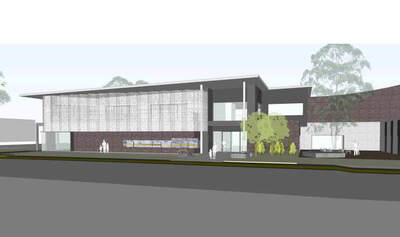 Capital projects such as the $20m Cowes Cultural Centre will be the key to rebuilding Bass Coast’s devastated economy after the COVID-19 crisis.
Capital projects such as the $20m Cowes Cultural Centre will be the key to rebuilding Bass Coast’s devastated economy after the COVID-19 crisis. THE COVID-19 crisis poses a global health management challenge whilst concurrently pulling down our social, financial and commercial structures. The cost of control is immense but the horror of an out-of-control pandemic is truly frightening. I am comforted by the willingness of the Government to accept the science on this disaster.
Locally, Bass Coast Health’s leadership has put us in good stead to manage an outbreak of the disease and I’m pleased with the municipal emergency arrangements led by council. This has rightly been the priority at this stage.
As a large local employer, the council has maintained its workforce, now largely working from home. This is fundamental to maintaining a viable economy as well as continuing to deliver council services. It’s no time to be cutting jobs. Every loss of a wage is a negative shock in our economy, one more person who doesn’t have the money in their pocket to buy new clothes, a haircut, coffee or the tools for that DIY project.
Federal and state efforts are focused on maintaining jobs and financial survival, and so too is Council. At this week’s meeting, councillors voted to defer a range of projects to free up $700,000 to assist business and community. Last month Council approved a hardship policy that allows people under financial stress to defer rate payments.
The damage is already being hard felt across the region and especially on Phillip Island in an economy geared to a tourism industry that has collapsed. We are the second most tourism-dependent economy in the country, built on the region’s amazing natural environment. It has become even more dependent given the growth in international visitors from China and India. How do you build resilience into this economy?
But the time will come – hopefully soon – when the focus will shift to stimulus and investment in projects that create jobs. Capital projects are the foundation of rebuilding the economy. Council’s job is to focus investment locally and to gain as much support as we can from the other levels of government on shovel-ready projects. From this investment we will again see local people with money to spend locally on services, cafes and recreation.
We are fortunate that we already have several projects under way. Foremost is the Cowes Cultural Centre, a $20 million injection into the local economy. This could not be coming at a better time and it will bring activity and spending power to the heart of Cowes.
Some are arguing that it is not the time to be borrowing money for undertaking a large project. One of the great learnings from the Great Depression of the 1930s was the work of John Maynard Keynes who developed the General Theory of Economics. My crude summary is that governments should spend at times of economic downturn and withdraw when the market is booming.
Another great learning from the Depression was the New Deal, a massive government spending and reform package put in place by President Franklin Roosevelt that ultimately led the US and the world out of the economic mire. More recently we saw the rapid response of the Rudd Government in Australia to quickly inject money into the economy at the start of the global financial crisis, leaving Australia as one of the few countries not to go into recession.
The federal and state governments are spending large amounts of money, incurring debt, to cover this “rainy day” period we are experiencing. Beyond this, much more will be required to guide the economy out of recession.
The most dangerous term I have heard recently is “Snap Back”. coined by the Prime Minister to describe the end of the government assistance package after the six-month period. This would constitute an enormous secondary economic shock that would plunge Australia further into recession and probably depression. The assistance already in place will be required for quite some time.
Much more investment will be required at the recovery stage. This spending should be focussed on intergenerational infrastructure projects and it will require debt funding that will be paid back over a number of years.
This represents a perfect opportunity to shift Bass Coast’s economy into the green economy vital to meeting the challenges of climate change. Projects could include new pathways to facilitate active transport, renewable energy and storage through community energy projects, electric vehicle infrastructure, energy efficient housing and energy efficient public transport and freight movement.
With so many people suddenly having time on their hands, it’s a great opportunity to participate in the council’s Climate Change Action Plan Survey at www.basscoast.vic.gov.au/climateaction.